|
|
|
Sort Order |
|
|
|
Items / Page
|
|
|
|
|
|
|
| Srl | Item |
| 1 |
ID:
185959
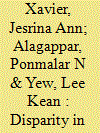

|
|
|
|
|
| Summary/Abstract |
This article examines the effect of academic qualifications and networking ties towards the evolvement of micro, small-medium, and large ethnic Indian enterprises in Malaysia. The study is based in multicultural Malaysia, where certain policies were implemented in favor of one specific ethnicity. Research indicates that better academic qualifications through transgenerational succession affect how entrepreneurs form connections with their families, co-ethnic networks, and inter-ethnic networks to develop their businesses. This article explains that while micro and smaller firms are choosing to remain in their ethnic identity, medium and larger corporations are willing to shed their ethnic identity for the rapid growth of their businesses. A framework is built from the understanding of literature and past evidence on ethnic Indian entrepreneurship in Malaysia. This article demonstrates the disparities of Malaysian Indian businesses that have progressed differently over the generations, due to the impact of human and social capital.
|
|
|
|
|
|
|
|
|
|
|
|
|
|
|
|
| 2 |
ID:
185958


|
|
|
|
|
| Summary/Abstract |
The qualitative study described in this paper aims to explore perceptions and challenges associated with a bi-ethnic identity in a multi-ethnic country. Sample of this study was recruited by snowball sampling technique. Semi-structured, in-depth interviews were conducted with fifteen Chindian adolescents. Results yielded a number of themes related to the perceptions of being a Chindian (i.e., enjoy the best of both worlds, peer acceptance, and sense of pride) as well as challenges (i.e., phenotype ambiguity, social insensitivity, situational ethnicity, and identity crisis). More research is required to identify ways to overcome challenges associated with bi-ethnic identity and to examine how these challenges would affect identity formation.
|
|
|
|
|
|
|
|
|
|
|
|
|
|
|
|
| 3 |
ID:
185978
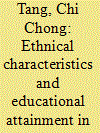

|
|
|
|
|
| Summary/Abstract |
Ethnicity refers to a group of people who share particular characteristics and identity in society. Being a member of an ethnicity means sharing values, power, and status of the corresponding group. Many studies have shown that ethnical differences exist in communities, but the empirical research on the ethnicities of Chinese and Portuguese in Macao, the very first city of China interacting with the West, is scant. This paper uses the multinomial logit model and presents evidence about the influence of ethnical characteristics on the educational attainment in Macao, China. Data are drawn from the Statistics and Census Service of the government of Macao China. The findings confirm that ethnical characteristics do affect educational attainment after controlling for age and gender. In addition, multiracial (Chinese and Portuguese) and Portuguese have higher educational attainment in general, however, the effects of ethnic characteristics are decreasing in young generations.
|
|
|
|
|
|
|
|
|
|
|
|
|
|
|
|
| 4 |
ID:
185981


|
|
|
|
|
| Summary/Abstract |
Migration has often led to both social and linguistic changes as migrants want to establish a sense of belonging to the host community by adopting the local culture and language while remaining loyal to mother tongue. For this reason, migrants’ language ideologies and practices at home deserve research attention. This paper reports on a study that explored the language ideologies and practices of three Hakka-speaking families who migrated to Guangzhou (Capital city of Guangdong Province) over different time periods. The study involved the methods of semi-structured interviews, observing family language practices, recording and exploring how identified inter-generational language shifts unfolded. The results suggest that a combined use of Hakka and Putonghua is the most common language practice at home and children’s Hakka development varies. They also reveal that grandparents constitute the source of Hakka input for children and play a significant role in passing the language to the next generation.
|
|
|
|
|
|
|
|
|
|
|
|
|
|
|
|
| 5 |
ID:
185964
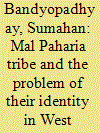

|
|
|
|
|
| Summary/Abstract |
The present paper is an outcome of the ethnographic study conducted among the Mal Paharia of Kuthuria village under the jurisdiction of Purbasthali Police Station in Purba Burdwan district of West Bengal, India. The paper deals with the migration, present socio-economic condition, status as per Socio-Economic Status (SES) scale, life–cycle rituals, traditional political organization and religion. It also informs us about the availability of Aadhar, Epic, Ration card, Caste certificate, Bank account, life insurance and job card that are said to constitute the State Conferred Identities (SCI) of this group. They are now facing a problem in the procurement of caste certificate, which is related to the identity of this group. The paper makes an attempt how anthropologists would approach this problem and suggest a solution.
|
|
|
|
|
|
|
|
|
|
|
|
|
|
|
|
| 6 |
ID:
185972
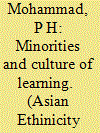

|
|
|
|
|
| Summary/Abstract |
What are the factors hindering educational development among Muslims in India in general and the newly born Telangana state in particular, is the key sociological question confronting the educationists and policymakers? The current paper based on empirical study provides an anthropological perspective to understand a number of socio-cultural factors responsible for lower retention and higher dropout rates among Muslims in public schools across the class and gender lines. It highlights that with positive state interventions, the enrolment and retention levels of Muslim working-class children have increased enormously besides a significant improvement in the same among Muslim girls also. Thus the paper argues that a relaxation in school protocols facilitates Muslim children integrating the academic demands and socio-cultural obligations they deem necessary while addressing culturally sensitive issues in curriculum and pedagogic practices foster attitudinal changes together which contribute immensely to the educational advancement among them.
|
|
|
|
|
|
|
|
|
|
|
|
|
|
|
|
| 7 |
ID:
185986
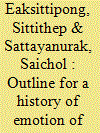

|
|
|
|
|
| Summary/Abstract |
This article attempts to cast the history of the Chinese in Thailand into a new light by framing it within the realm of emotion. Through writing the history of the Chinese from this new perspective and utilizing media such as newspapers, films, novels, etc., loaded with Chinese emotional expression towards the Thai state, society, and self as evidence reflecting emotional lives of the Chinese, we provide a preliminary outline to a history of emotions of the Chinese in Thailand. We argue that, in pursuing the assimilation of the Chinese into Thai society, the Thai state constructed an emotional regime based on the feeling of shame to govern the Chinese. The Chinese, however, found emotional refuge and liberation from the regime in transnational Chinese media and Thai-ified Sinophone literature, which played a significant role in identity politics of Chinese self-identification as neither Thai nor Chinese, but Chinese of Thailand.
|
|
|
|
|
|
|
|
|
|
|
|
|
|
|
|
| 8 |
ID:
185983
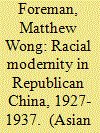

|
|
|
|
|
| Summary/Abstract |
This article locates the moment in Chinese history when ethnicity became a subject of scientific concern and an object of social engineering. Specifically, it examines how Han Chinese academicians during the Nanjing decade (1927–37) argued for the necessity of social engineering by appealing to race science. Focusing on a debate between the eugenicist Pan Guangdan and the anthropologist Wu Zelin, it argues that the Nanjing decade witnessed a key moment of ideological convergence in the physical and social sciences. Academicians concerned with national and racial salvation believed in awakening the Chinese population’s racial consciousness, which could only be achieved through rigorous social engineering. To justify the state’s homogenizing claims over ethnic minorities, they appealed to the doctrine of racial homogeneity, capitalized on the increasing cultural authority of scientific empiricism to recruit political allies to their cause, and endeavored to embed the ‘fact’ of ‘race’ from specialized disciplines to political institutions.
|
|
|
|
|
|
|
|
|
|
|
|
|
|
|
|
| 9 |
ID:
185967
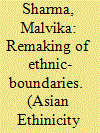

|
|
|
|
|
| Summary/Abstract |
Being an Ethnic-Pahari-Sikh-Borderlander in Poonch, Jammu and Kashmir is a phenomenon that adds to the discourse of ethnicity and nationalism. Partition of the Indian sub-continent in 1947 acted as a disruption in the socio-political history of the ethnic-community of Poonch generating difference and othering. This led to a newer set of challenges that re-imagines the concept of ethnicity altogether. Through an ethnographic account of the religiously assertive Sikh-identity in Poonch, this study asks the questions: Can the religious-reassertion of identities in a community render a concept as giant as ethnicity a myth? What happens to the historic origins of ethnic-bonds when identities begin to organise themselves exclusively on religious lines? Identities in Poonch exist at crossroads where being a religious Sikh challenge the idea of an ethno-geographic Sikh, both of them trying to co-exist under a bigger identity of being a borderlander.
|
|
|
|
|
|
|
|
|
|
|
|
|
|
|
|
| 10 |
ID:
185957
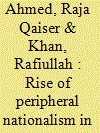

|
|
|
|
|
| Summary/Abstract |
Pakistan is facing a robust wave of nationalism in the shape of the Pashtun Tahafuz (protection) movement. It is not the first time Pakistan is experiencing the outburst of a peripheral nationalist movement. Since the inception of Pakistan in 1947, it has been confronting the multiple challenges stemming out from the ethnic movements. Pakistan was fragmented in 1971 at the hands of the Bengali sub-nationalist movement. The separatist demands in Sindh and the secessionist demands in Baluchistan have been striking the polity. The Pashtun nationalism is emerging as a new daunting challenge in the aftermath of the war on terrorism in the contemporary political and social landscape of Pakistan. This study will make a multi-pronged analysis of the propensity of peripheral nationalist movements in Pakistan and will dissect the rise of the Pashtun Tahafuz movement and its possible implications for state and society in Pakistan.
|
|
|
|
|
|
|
|
|
|
|
|
|
|
|
|
| 11 |
ID:
185973


|
|
|
|
|
| Summary/Abstract |
This study analyzes the historical phenomena of zending in Batak tribe community. It focuses on the transition of Christianity among the Simalungun people, by using the primary and secondary sources tracked from various library locations, church archives, national archives in Jakarta, and private collections. The theme is categorized into cultural history, with source search (heuristic), source criticism, formulation of facts (aufassung), and presentation of new thoughts (darstellung), all narrated as historical stories. Other secondary sources came from a number of books, articles, and magazines, published in various eras. The cause of mass conversion among the Simalungun people is apparently related to the feudal structure of their society. The zendelings used both the community structure approach and customary approach. Consequently, the development of RMG zending activities in the Simalungun community, besides causing religious conversion from the Sipajuh Begu-begu tribe religion to Christianity, also gave rise to structural changes in the community.
|
|
|
|
|
|
|
|
|
|
|
|
|
|
|
|
| 12 |
ID:
185974


|
|
|
|
|
| Summary/Abstract |
Karl Polanyi argues that the discipline of economics has emerged from the observations of human beings and their practices existing in a society. Since humans are perceived primarily as social beings rather than economic ones, embeddedness is a necessary and basic condition of the economy. This paper is an attempt to observe study and understand the inter-sectional application of these concepts of embeddedness and ethnic solidarity, in the socio-economic context of the Tibetan refugee community residing in India. Our study’s fieldwork was focused on observing the functioning of the local Tibetan economy in Mcleodganj (Dharamshala), where two Tibetan knowledge systems: the Thangka art and the Tibetan healing system were closely studied, reflecting Tibetan culture, and the community’s effort to preserve and promote these knowledge systems in different economic forms.
|
|
|
|
|
|
|
|
|
|
|
|
|
|
|
|
|
|
|
|
|